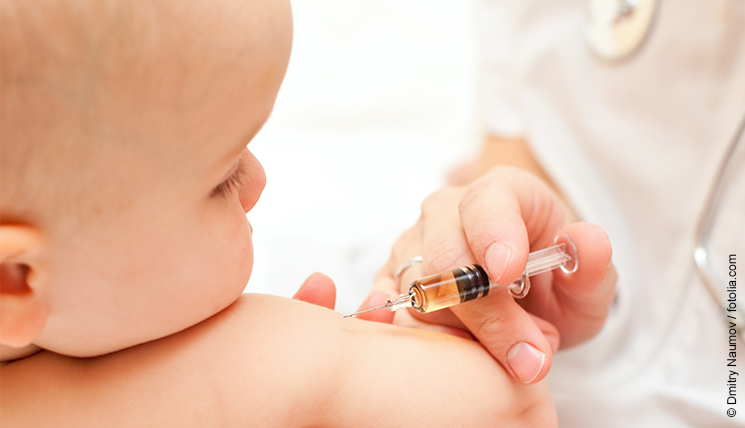Recently, a new law on measles vaccination has been passed in Germany. As of March 2020, all children in Germany from the age of one year must present proof of their vaccination against measles, as recommended by the Standing Committee on Vaccination (StiKO), before their admission into crèche, kindergarten, school or other childcare, such as child minders. The same applies to the staff of these care facilities as well as employees of medical institutions.
Measles are often considered as a harmless children’s disease. But infections with the highly contagious measles virus can lead to severe complications. The new law aims to to protect children by vaccination. Secondly, also those persons shall be protected who cannot be vaccinated due to their age or for any health reasons by achieving a nearly nationwide immunisation.
The easiest and most reliable way of verifying the vaccination status is to check the vaccination card. According to the German Robert Koch Institute, immunity can be assumed after two vaccination shots. As an alternative, immunity can also be proven by a medical certificate.
Recent research findings have shown that the immune protection against measles virus is based on a complex interaction of cellular and soluble components of the immune system. This is the reason why there are not yet any general recommendations for the assessment of the immunity status. However, measles virus-specific IgG antibody titers that allow assumption of immunity have been described in some publications [1, 2, 3, 4]. Principally, IgG titers from a concentration of 200 mIU/ml are considered as sufficiently protective. Nevertheless, the immune response is very individual and not all patients with a titer of 200 mIU/ml are necessarily protected against measles.
Serological test systems which are used to assess immunity to the measles virus must be calibrated with respect to the 3rd international standard serum NIBSC 97/648. This is the prerequisite to be able to interpret test results according to the reference value 200 mIU/ml.
The EUROIMMUN Anti-Measles Virus ELISA (IgG) is in accordance with these specifications and thus allows evaluation of a patient’s immune status. Measuring an anti-measles virus IgG titer below 150 IU/l a lack of immunity has to be assumed. A titer above 200 IU/l justifies the assumption of sufficient protection [5].
If acute measles virus infection is suspected despite all preventive measures the determination of virus-specific IgM antibodies is, alongside direct pathogen detection, the fastest and safest diagnostic method according to the Robert Koch Institute. The EUROIMMUN Anti-Measles Virus NP ELISA IgM uses virus-specific nucleoproteins as the substrate. These allow a more specific detection of anti-measles virus IgM than virus lysates. As a supplement, avidity determination of IgG antibodies (Anti-Measles Virus ELISA IgG Avidity) can also aid in the diagnosis of measles. In particular, the detection of highly avid antibodies is considered as exclusion criterion for an acute measles virus infection.
References:
- Poethko-Müller C et al. Seroprevalence of measles-, mumps- and rubella-specific IgG antibodies in German children and adolescents and predictors for seronegativity. PLoS One 7(8):e42867 (2012).
- Tischer A et al. Vaccinated students with negative enzyme immunoassay results show positive measles virus-specific antibody levels by immunofluorescence and plaque neutralisation tests. J Clin Virol 38(3): 204-9 (2007)
- Siennicka J et al. The significance for epidemiological studies anti-measles antibody detection examined by enzyme immunoassay (EIA) and plaque reduction neutralization test (PRNT) Przegl Epidemiol 68(3): 417-20, 527-9 (2014)
- World Health Organization. Manual for the Laboratory-based Surveillance of Measles, Rubella and Congenital Rubella Syndrome. Immunization, Vaccines and Biologicals. 3rd Edition, June 2018.
- EUROIMMUN test instructions. Anti-Measles Virus ELISA (IgG), order no. EI 2610-9601 G

